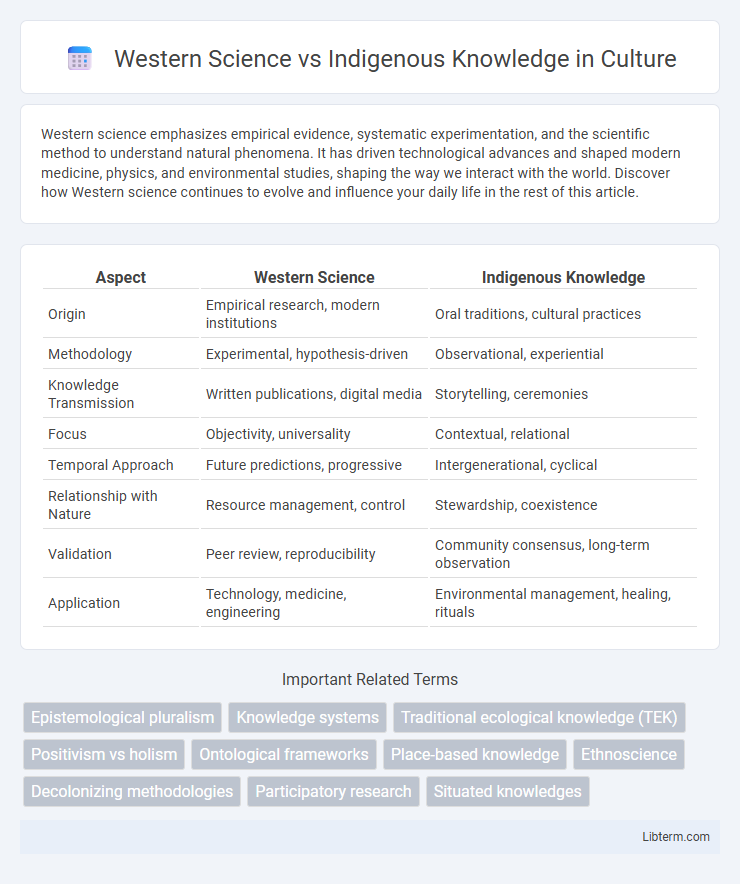Western science emphasizes empirical evidence, systematic experimentation, and the scientific method to understand natural phenomena. It has driven technological advances and shaped modern medicine, physics, and environmental studies, shaping the way we interact with the world. Discover how Western science continues to evolve and influence your daily life in the rest of this article.
Table of Comparison
| Aspect | Western Science | Indigenous Knowledge |
|---|---|---|
| Origin | Empirical research, modern institutions | Oral traditions, cultural practices |
| Methodology | Experimental, hypothesis-driven | Observational, experiential |
| Knowledge Transmission | Written publications, digital media | Storytelling, ceremonies |
| Focus | Objectivity, universality | Contextual, relational |
| Temporal Approach | Future predictions, progressive | Intergenerational, cyclical |
| Relationship with Nature | Resource management, control | Stewardship, coexistence |
| Validation | Peer review, reproducibility | Community consensus, long-term observation |
| Application | Technology, medicine, engineering | Environmental management, healing, rituals |
Understanding Western Science: Principles and Approaches
Western Science emphasizes empirical evidence and systematic experimentation as foundational principles, relying on reproducibility and quantifiable data to validate hypotheses. It employs reductionism to analyze complex phenomena by breaking them into smaller parts, fostering specialization in distinct scientific disciplines. The scientific method, characterized by observation, hypothesis testing, and peer review, underpins Western Science's approach to knowledge acquisition and technological advancement.
Defining Indigenous Knowledge Systems
Indigenous Knowledge Systems (IKS) encompass the unique, traditional understandings, skills, and philosophies developed by indigenous communities through centuries of interaction with their natural environment. These systems prioritize holistic, community-based approaches to ecology, health, and social organization, contrasting with the empirical, reductionist methods typical of Western science. Recognizing Indigenous Knowledge as dynamic and adaptive highlights its critical role in biodiversity conservation, sustainable resource management, and cultural preservation.
Historical Context: Colonialism and Knowledge Suppression
Colonialism systematically marginalized Indigenous knowledge systems by imposing Western scientific paradigms as superior and legitimate, often leading to the suppression and devaluation of traditional ecological and cultural wisdom. Historical records reveal that colonial administrations enacted policies that restricted the practice and transmission of Indigenous knowledge, impacting biodiversity management and community resilience. This legacy has contributed to ongoing challenges in recognizing and integrating Indigenous epistemologies within contemporary scientific and policy frameworks.
Epistemological Differences: Ways of Knowing
Western Science relies on empirical evidence, experimentation, and systematic observation to generate knowledge, emphasizing objectivity and replicability. Indigenous Knowledge is rooted in long-term relationships with the environment, oral traditions, and spiritual understanding, valuing holistic and contextual insights. These epistemological differences highlight contrasting methods of validation, with Western Science privileging reductionist analysis and Indigenous Knowledge integrating relational and experiential wisdom.
Approaches to Evidence and Validation
Western science relies on empirical evidence, systematic experimentation, and reproducibility as key methods for validation, emphasizing quantifiable data and peer review. Indigenous knowledge prioritizes holistic understanding, oral traditions, and experiential learning, validating information through long-term observation and community consensus. Both systems offer complementary perspectives, with Western science focusing on universal principles and Indigenous knowledge emphasizing context-specific insights and relationships with the environment.
Relationship with Nature: Exploitation vs. Stewardship
Western science often approaches nature as a resource to be analyzed, controlled, and exploited for human benefit, emphasizing mechanistic understanding and economic gain. Indigenous knowledge centers on stewardship, viewing humans as integral to ecosystems and advocating for sustainable practices that maintain ecological balance and respect biodiversity. This contrast highlights fundamentally different attitudes: Western science prioritizes exploitation through discovery and innovation, while Indigenous knowledge promotes harmony and long-term environmental caretaking.
Language and Knowledge Transmission
Indigenous knowledge relies heavily on oral traditions, storytelling, and languages rich in context to transmit ecological and cultural wisdom across generations, ensuring community cohesion and environmental stewardship. Western science prioritizes written documentation, standardized terminology, and formal education systems that facilitate systematic experimentation and global knowledge dissemination. The divergence in language structure and transmission methods reflects differing epistemologies, with Indigenous languages embodying holistic worldviews while scientific language emphasizes precision and reproducibility.
Integration and Collaboration: Bridging the Gap
Integrating Western science with Indigenous knowledge fosters holistic understanding by combining empirical research with traditional ecological wisdom. Collaborative projects that respect Indigenous protocols enhance biodiversity conservation and climate resilience, reflecting a synergy between technological innovation and ancestral practices. This bridge creates inclusive frameworks for sustainable development, ensuring that diverse epistemologies contribute to problem-solving and policy-making.
Contemporary Challenges and Opportunities
Western science often prioritizes empirical data and standardized methodologies, while Indigenous knowledge emphasizes holistic understanding and intergenerational wisdom. Contemporary challenges include reconciling these differing epistemologies and addressing intellectual property rights to protect Indigenous knowledge from exploitation. Opportunities arise in collaborative research frameworks that integrate traditional ecological insights with scientific innovation to enhance sustainability and biodiversity conservation.
The Future of Knowledge: Toward Mutual Respect and Coexistence
The future of knowledge embraces the integration of Western scientific methods and Indigenous knowledge systems, fostering mutual respect and coexistence. Recognizing Indigenous knowledge's deep ecological insights and community-based approaches enriches scientific understanding and innovation. Collaborative frameworks that honor both epistemologies promote sustainable solutions and cultural resilience in addressing global challenges.
Western Science Infographic

 libterm.com
libterm.com